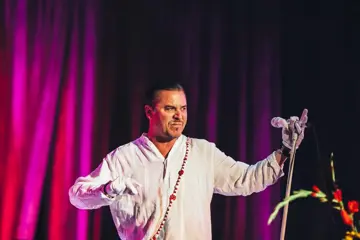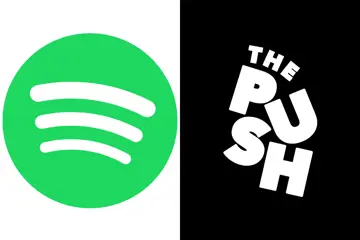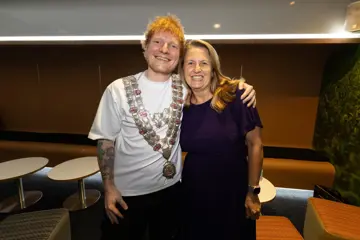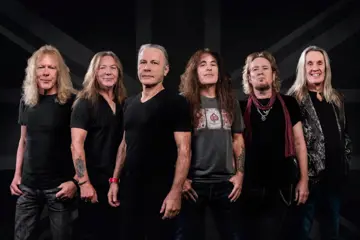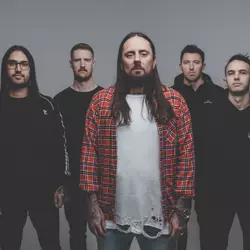 Thy Art Is Murder
Thy Art Is Murder"Right up until six weeks out, eight weeks out to vocal tracking, it was still CJ McMahon in one hand, and Nicholas Arthur from Molotov Solution in the other," Thy Art Is Murder's forthright guitarist Andy Marsh explains of the scenario surrounding their fourth full-length, Dear Desolation. "Both phenomenal vocalists; in my opinion we could only have one or the other, no other vocalists worked to our taste."
McMahon stunned devotees of the Western Sydney-bred, now international deathcore outfit by returning at this year's UNIFY Gathering, after departing in 2015. In the interim, other singers including triple j's Lochlan Watt substituted on the road. Reasons cited for the perennially outspoken McMahon's leaving - financial woes, crippling drug addiction - have been extensively dissected. "He wanted to come back, but we weren't sure whether we were willing to accept him back, [and] whether he had truly made the adjustments in his life that we felt he needed to assimilate into a band environment," Marsh explains from his home in Minneapolis.
"Once we nailed down that he was coming back, we felt that we had great songs, and his voice came back pretty well I feel. Him being better has made everyone get along better, him being better as a person... He made a lot of changes last year, and we were sceptical about that, but as we've gotten through the past seven months together, every day he just blows my mind. It has made the band a better unit together because he's so mentally healthy now that he's not aggressive, he's not angry at us, and we're not treading around him in fear."
There may have been uncertainty regarding who would step up to the mic for Dear Desolation, but McMahon seemingly indirectly helped shape the record anyway. Songwriters Marsh and fellow guitarist Sean Delander again bunkered down in the US with producer Will Putney, who assisted with structures and arrangements. Marsh insists they "wrote music we were going to write anyhow" for the release, to be issued locally via the new Human Warfare label. "Obviously it's second nature for us to picture CJ's voice in mind, his delivery, and a sense of drama to the vocals that I feel Nick would... He would have a different spin on it. So we do have CJ in mind. Whether or not that really dictates how we write the music, I don't think it does.
Don't miss a beat with our FREE daily newsletter
"But it does change how we imagine it. It does influence the choice of words that I use when writing the lyrics as well, because I can imagine his voice. I pictured in my head as I'm writing the lyrics, there's a little mini-CJ in my brain, saying it really sick," Marsh chuckles. "Because I'm not a vocalist, I can't scream the lyrics and imagine how it sounds. So I sit there and picture his voice, and then like an actor, he just comes in with his script, gives feedback, does his thing and fucking nailed it on this record."
Thy Art Is Murder's chart-bothering 2015 album Holy War spawned controversy for the anti-religious stance of the title track's video, and the cover's image a child suicide bomber. This time around they tackle themes like existentialism and the human condition with trademark intensity.
"Holy War was more outward expression - this happened to me, this is happening around me, this is causing this, and this is causing these feelings. And (2012's) Hate was a little bit more primitive than that, where it was just unbridled aggression and hatred for those things," the axeman explains. "Holy War became the discussion of what those things were. If you think about it in that progression or maturing stages of, I guess, my psyche, Dear Desolation is more what's going on inside of my brain in response to that hate, or the discussion with yourself about realising I'm hateful or aggressive, sad or depressed. And also more about what feelings happen inside of myself at least, to understand what happens inside of everyone else that would make them do terrible things, or live lives that so far have been not understandable to me.
"Just as I'm getting older and I had a kid, the thought of dying, being secular, so being a person of faith or atheist, and different levels of fear that come into contemplating those situations when you're thinking of existential crises. One day I might die and I'll never see my daughter again, whereas most faithful people live eternally. So, 'Oh, I'll die and then I'll just sit up in the sky and wait for her to join me.' Like, this very idealistic image of what that is. And that's a beautiful thing to think that, but I'd rather swallow the difficult pill that this life is all that I have. A lot of the songs are that kind of discussion with myself, and coming to grips with that journey through life of expecting that death is final."









